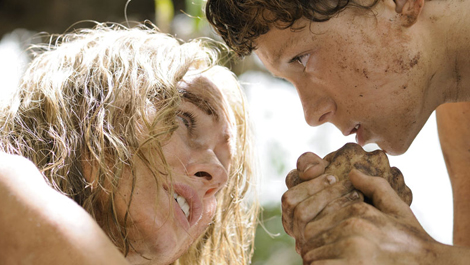Why you can trust GamesRadar+
At a time when horror movies had turned to schlock, Juan Antonio Bayona’s The Orphanage (2007) brought emotional care to screen scares with an adult fairytale about clinging onto the impossible even when all hope seems lost.
For his follow-up, he tackles similar themes with far greater ambition yet no loss of control.
The disaster movie is its field, but Bayona’s tragic true-life tale is a far cry from The Day After Tomorrow on all fronts: its visceral force is more aggressive, its emotions cut deeper and its intelligence makes fiercely affecting work of close-to-the-bone material.
Which is to say, Bayona may have achieved the near-impossible.
A film about the Indian Ocean tsunami of Boxing Day 2004 could have been crass. Make it too grim and it might look exploitative – too much, too soon. Hammer on a happy ending and it could become a Hollywood gloss on a human catastrophe, a Euro auteur compromised on his English-language debut.
Yet Bayona and his writer Sergio G. Sanchez get almost everything right, starting with the decision to follow one family’s (based on real-life Spanish family the Belons) arc.
Sure, the choice seems iffy given how many lives were lost; sure, too, the decision to cast English-language actors seems commercially calculated.
But zeroing in on Henry Bennett (Ewan McGregor), his wife Maria (Naomi Watts) and their sons Lucas (Tom Holland), Simon (Oaklee Pendergast) and Thomas (Samuel Joslin) works by subverting the ensemble emphasis of most disaster movies.
Instead of skimming the surface of several characters in order to energise pacing, Bayona focuses on one tight group, putting keen characterisation before momentum.
The opening scenes are slightly stiff, but they give us time to get know the family as they arrive at the beach resort of Khao Lak, Thailand, for what should be a blissful Christmas break.
As presents are given, lanterns lit and ball games played, the knowledge of what’s to come embeds our fear for their well-being in the narrative: you could call that manipulative, but it’s careful, effective manipulation.
Proof comes when the tsunami hits, in a devastating 10-minute sequence that never loses sight of the anguish at its core. Disaster porn? Think again.
Beginning with distant eco-horror rumbles and then slamming the screen so hard you’re left breathless, Bayona opts for the fear and confusion of first-person filmmaking over the cruder option of show-us-the-money-shot awe.
As wave upon wave wallops Maria and oldest son Lucas senseless, their terror hits us like a gut-punch, an impact boosted by Oriol Tarragó’s pulverising sound design.
The decision to shoot using practical effects pays off: this is physical filmmaking of implacable immediacy.
In many films their survival would be the climax, but what follows is equally crucial to Bayona’s tale of hope in a dark place.
Mum and son make their way to safety, but their fight isn’t finished. Maria has incurred horrific injuries, not just from the waves but from the debris that tore her flesh underwater.
And they have a family to hunt down, a mission that sees Lucas dispatched to find them in and around a makeshift hospital resembling something from a war movie, where the increasingly resourceful kid recalls Christian Bale’s Jim in a bloodier Empire Of The Sun .
The Spielberg comparison fits, because Bayona borrows the best of the ’Berg and adds his own raw power.
Wide shots and extreme close-ups are navigated with a symmetry comparable to classic Spielberg’s fluency.
The command of spectacle is astoundingly evolved and considered for a sophomore director, like Spielberg’s watery breakthrough Jaws in more testing waters.
The respect for children echoes Spielberg minus the sentiment, with Lucas played as a pain in the arse who grows before our eyes.
And the hope and compassion draw on Berg’s humanist qualities, though Bayona lets the drama get believably messier than Spielberg might have done.
Fernando Velázquez’s score recalls Spielberg’s weaknesses too, perhaps nudging too hard when only nuance was needed, but the cast are note-perfect.
Watts is all flayed nerves and flesh as a mother at life’s jagged edge: gored, emotionally ravaged, yet exuding fierce parental love even when bed-bound.
McGregor stumbles at first but comes into his own, playing tender havoc on our heartstrings during a mobile phone call.
Holland gives both a run for their money, persuasively scared and brave as Lucas is called on to provide little – but, in this context, huge – acts of kindness for other families.
And there’s a tingly cameo from The Orphanage ’s Geraldine Chaplin, delivering a potentially sappy but – again, in context – tenderly moving monologue about death.
The climax could have been pure syrup too, but Bayona judges it just right. A nightmarish flashback and lines of body bags ram home the fact that closure doesn’t come easily after a tragedy like this, if ever.
Far from providing pat uplift or a devastating downer, Bayona treads a finer line with care, crafting a structurally satisfying close, at the same time acknowledging that the struggles are far from over. The experience may never leave the survivors.
Like the rest of this smart, sensitive film, it’s a smart, sensitive end note that sticks with you.
Kevin Harley is a freelance journalist with bylines at Total Film, Radio Times, The List, and others, specializing in film and music coverage. He can most commonly be found writing movie reviews and previews at GamesRadar+.



